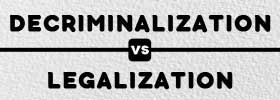Law & Ethics
|
Counterintelligence investigations work on a national and international level to find spies and prevent espionage against the country. Criminal investigations work on a smaller and national level to solve a particular crime by searching for evidence. |
|
Mandatory means something that has been handed down in a mandate or has been commanded. Indispensable means something that is important and cannot be ignored or is necessary. Mandatory is backed by laws or some type of rules, but indispensable is something that’s subjective and not required by rules or laws. |
|
Decriminalization is the process of not considering something a crime anymore. Decriminalizing something may involve reducing the criminal penalties rather than removing them completely. Legalization, on the other hand, is the process of removing the criminal penalties from something. In most cases, this includes nearly all of the penalties. |
|
Both an attorney and solicitor are types of lawyers. The term attorney tends to refer to a person who tends to act on behalf on someone else, especially in business or legal matters. A solicitor is a person of a legal profession who is qualified to deal with conveyancing, the drawing up of wills, and other legal matters. |
|
Basically, a lawyer is someone who has studied and trained in law. Lawyer is a basic term that refers to any person who has a law degree. An advocate is a special type of lawyer, who is eligible to stand in court and represent a client. |
|
Murder is the killing of one human being by another. It is usually done for personal reason such as love, anger, or greed. An assassination is the murder of an important person which is conducted for political or religious reasons. |
|
Detention is when the police or any authority holds someone under suspicion but have not charged them with a crime. Arrest is when the police charges someone with a crime and then takes them into custody. |
|
Extortion refers to intimidating or threatening the person with violence in exchange for monetary compensation, blackmail, on the other hand, refers to threatening the person with social, emotional, or professional ruin in exchange for either monetary compensation or doing something the blackmailer wants. |
|
A DMCA Notice is a notice that a person or company can send to another who has been using their copyrighted content without their permission. The notice tells the infringer to take the copyrighted content down, as per the laws of the DMCA. |
|
EULA, which stands for end-user license agreement, is a type of license agreement that details how a product or service can and can’t be used. Terms of Use are a set of rules and regulations that the user must agree to in order to be able to use a product of service. |
|
A Privacy Policy is a statement or a legal document that discloses to the audience that their information in being collected by the website or app. Terms and Conditions are a set of rules and guidelines that one must abide by in order to use the service. They are also commonly called terms of use or terms of service. |
|
The Privacy Policy should inform the site visitors about the fact that the website will collect the data, as well as what data will be collected and what the data will be used for. A Disclaimer is a statement that warns the audience that the website is not legally responsible for the information provided on it, and what the user does with the information. |
|
Both, Power of Attorney and Letter of Authority are used to give someone else power or authority to do something on your behalf. The main difference between the two is the fact that while the Letter of Authority gives someone authority to act on behalf of someone for a specific manner, the Power of Attorney gives someone total power to act, speak or make decisions on their behalf. |
|
A minor refers to somebody who is not yet an adult, at least not in the eyes of the law. The person can be a child or a teenager, as long as they can’t be called as adult. Juvenile may indicate or reference legality. While it does technically mean young, the term is often also used in the sense of the law, where it refers to a young person who has been accused of a crime. |
|
Negligence refers to a sense of duty that each individual has towards each other. However, if that duty is not followed, then it can be termed as negligence. Malpractice can be classified as a segment or a part of negligence, as negligence that causes harm is called malpractice. The terms are most commonly used in the context of medical practice, where they are termed as Medical Malpractice and Medical Negligence. |
Pages
 |
 |
 |
 |
 |
 |
 |
 |















